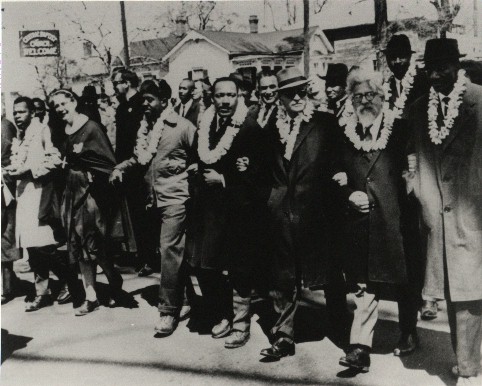
Rabbi Augustin Bea and Rabbi Abraham Joshua Heschel at a meeting arranged in 1963 by the American Jewish Committee and endorsed by Pope Paul VI.
 Rabbi Abraham Joshua Heschel (2nd from r.) and Martin Luther King, Jr. (4th from r.) in the Selma to Montgomery "Civil Rights" March in 1965.
Rabbi Abraham Joshua Heschel (2nd from r.) and Martin Luther King, Jr. (4th from r.) in the Selma to Montgomery "Civil Rights" March in 1965.Rabbi's legacy of spirituality and activism is guiding light
By G. Jeffrey MacDonald
USA TODAY
01/31/2007
When members of Mishkan Shalom Synagogue in Philadelphia need inspiration to tackle society's thorny problems, they look no further than a social room named for their late hero: Rabbi Abraham Joshua Heschel.
It's a testament to the power of his life and his teaching," Rabbi Jeff Sultar says. In the room, a hanging photo shows the wild-haired rabbi marching in Selma, Ala., in 1965 with Martin Luther King Jr. "It reminds us that spirituality is continuing to steer us back into the world rather than to take us out of it."
This year at the centennial of Heschel's birth, Jews and gentiles alike are remembering him as more than one of the most influential theologians of the 20th century. For people of varied backgrounds, he also is an enduring role model.
For the centennial, academics will debate Heschel's significance at Brandeis University in Waltham, Mass., on March 11-12. Another conference is Sept. 7-9 at the Thomas Merton Center at Ballarmine University in Louisville. Yale University Press will release Volume 2 of his biography ...
Richard John Neuhaus joined with Heschel and peace activist Daniel Berrigan in 1965 to establish the influential anti-war group Clergy Concerned About Vietnam. But today Neuhaus, a Catholic priest and editor of the religion journal First Things, says Heschel's influence on him and society is most clearly felt in Jewish-Christian relations, which Heschel shaped through his role as Judaic consultant to Vatican II at a time when Heschel's Hasidic community forbade theological dialogue with Christians.
Born Jan. 11 [I'll bet], 1907, in Warsaw, Heschel was a religious "prodigy," Kaplan says. By age 4, he already knew ancient Hebrew and Aramaic; as a teen, he published his first Talmudic commentary ...
Full article:
http://www.cjp.org/content_display.html?ArticleID=207542


0 comments:
Post a Comment